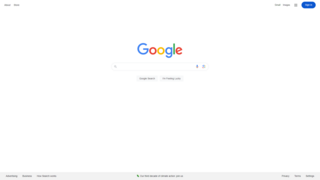Type of site | Search engine |
|---|---|
| Available in | English |
| Owner | Exponential Labs |
| URL | millionshort |
| Launched | April 30, 2012 |
| Current status | Online |
Million Short is a web search engine from Toronto-based startup Exponential Labs. [1] The search engine, which brands itself as “more of a discovery engine,” [2] allows users to filter the top million websites on the internet out of their search, resulting in a unique set of results and placing an emphasis on content discovery. This approach to search is also designed to combat the impact that aggressive black and grey hat SEO practices have on mainstream search results. [3] [4]
Million Short was conceived in 2012 by Exponential Labs. The program gathers results like any other engine, then uses web rankings to exclude the most popular sites before producing its final results. [5] More recently the company has continued to develop its own search technology and web crawling capacities, and uses proprietary data to help inform the Million Short search results. [3] [6]
Upon its April 2012 launch, Million Short earned significant attention, first from online communities such as Reddit [7] and Hacker News, [8] and then from both blogs and mainstream publications like the BBC, TechCrunch, The Atlantic, The Verge, Wired and The New York Times. [1] [3] [4] [9] [10] [11] [12] [13] [14] [15] [16] [17]
The months following Million Short's launch saw a number of updates to the engine, including international support, mobile and tablet optimization, browser search extensions, design updates, and voice search. [2]
Million Short was also the focus of research study How Relevant is the Long Tail? A Relevance Assessment Study on Million Short. Published in arXiv, a relevance assessment study with the Million Short long-tail web search engine. [18]
Following the initial interest in Million Short, Exponential Labs launched a series of projects related to Million Short, both as marketing endeavors and expansions on the search engine's initial premise.
Billed as the “inverse” of Million Short, Million Tall is another search engine created by Exponential Labs that indexes and displays results from only the top million sites on the internet (i.e., those that Million Short excludes). The project launched in July 2012, intended to highlight the frequency with which leading search engines display results from the same small number of websites. Its tagline asks: “Imagine a search engine that only indexed the top 1 million sites on the web. Would you even notice?” [2] [19]
In September 2012, Exponential Labs released Million Short It On, a site presenting a blind test between Million Short and Google search results. [2] [20] Users were presented with two sets of unbranded results for a given term, and instructed to determine which results were more useful. The project was based—both in name and concept—on Bing It On, a similar marketing campaign launched earlier that year, which, in turn, drew inspiration from the Pepsi Challenge in the 1970s.
December 2012 saw the release of Million Short DNS, a series of domain name system servers programmed to exclude specific domains on the internet, redirecting them instead to an error page. [2] Servers are available to exclude either the top million, hundred thousand, ten thousand, thousand, or hundred sites on the internet. [21]
In addition to redirecting the URLs of excluded domains, the servers will not load any content hosted on these domains. In some cases this results in missing images, typefaces, or JavaScript files, lending a radically different browsing experience even to sites that are not excluded.

Google Search is a search engine operated by Google. It allows users to search for information on the Web by entering keywords or phrases. Google Search uses algorithms to analyze and rank websites based on their relevance to the search query. It is the most popular search engine worldwide.

AlltheWeb was an Internet search engine that made its debut in mid-1999 and was closed in 2011. It grew out of FTP Search, Tor Egge's doctorate thesis at the Norwegian University of Science and Technology, which he started in 1994, which in turn resulted in the formation of Fast Search & Transfer (FAST), established on July 16, 1997.

Dyn, Inc. was an Internet performance management company that also dealt with web application security, offering products to monitor, control, and optimize online infrastructure, and also domain registration services and email products. The company was acquired by Oracle Corporation in 2016. It began operating as a global business unit of Oracle in 2017.

Yandex LLC is a Russian technology company that provides Internet-related products and services including a web browser, search engine, cloud computing, web mapping, online food ordering, streaming media, online shopping, and a ridesharing company.

OpenDNS is an American company providing Domain Name System (DNS) resolution services—with features such as phishing protection, optional content filtering, and DNS lookup in its DNS servers—and a cloud computing security product suite, Umbrella, designed to protect enterprise customers from malware, botnets, phishing, and targeted online attacks. The OpenDNS Global Network processes an estimated 100 billion DNS queries daily from 85 million users through 25 data centers worldwide.
Powerset was an American company based in San Francisco, California, that, in 2006, was developing a natural language search engine for the Internet. On July 1, 2008, Powerset was acquired by Microsoft for an estimated $100 million.

VirusTotal is a website created by the Spanish security company Hispasec Sistemas. Launched in June 2004, it was acquired by Google in September 2012. The company's ownership switched in January 2018 to Chronicle, a subsidiary of Google.

Cuil was a search engine that organized web pages by content and displayed relatively long entries along with thumbnail pictures for many results. Cuil said it had a larger index than any other search engine, with about 120 billion web pages. It went live on July 28, 2008. Cuil's servers were shut down on September 17, 2010, with later confirmations the service had ended.
Walmart Labs became part of Walmart Global Tech, the technology and business services organization within Walmart. Venky Harinarayan and Anand Rajaraman founded Kosmix in 2005. In April 2011, Walmart acquired Kosmix and formed @WalmartLabs, a research division, out of it. In 2016, Walmart combined Walmart Labs and its information systems division (ISD) into one team called Walmart Technology. In August 2020, Walmart Technology launched its new identity as Walmart Global Tech as part of a new technology and shared services organization within the world's largest retailer.

DuckDuckGo is an American software company focused on online privacy, whose flagship product is a search engine of the same name. Founded by Gabriel Weinberg in 2008, its later products include browser extensions and a custom DuckDuckGo web browser.
Qwiki was a New York City–based startup automated video production company acquired by Yahoo! on July 2, 2013 for a reported $50 million. Qwiki released an iPhone app that automatically turns the pictures and videos from a user's camera roll into movies to share. The company's initial product, an iPad application that created video summaries of over 3 million search terms, was downloaded more than 3 million times and named by Apple as the best "Search and Reference" application of 2011.
The Conduit toolbar was an online platform that allowed web publishers to create custom toolbars, web apps, and mobile apps at no cost. It was developed by Conduit Inc. but demerged to Perion Network. Conduit had approximately 260,000 registered publishers who have collectively created content downloaded by more than 250 million end users. Web apps and pieces of content developed through Conduit's platform can be distributed and exchanged online via the Conduit App Marketplace. As of 2010, 60 million users consumed apps from the marketplace on a daily basis.
Internet censorship circumvention is the use of various methods and tools to bypass internet censorship.

James Lanzone is an American businessman and the CEO of Yahoo Inc. Previously, he was CEO of Tinder. He is also the former president and CEO of CBS Interactive, a top 10 Internet property that operated key websites including CBS All Access, CNET, GameSpot, CBS News, Metacritic, CBS Sports, 247 Sports, Scout Media, MaxPreps.com, TVGuide.com, Last.fm and many others. He took over as president from Neil Ashe in March 2011. Lanzone later became the first chief digital officer of CBS Corporation. Prior to joining CBS Interactive, Lanzone was the founder and CEO of Clicker.com, a search engine and discovery guide for Internet video and television funded by Bill Gurley of Benchmark Capital, Geoff Yang of Redpoint Ventures, Allen & Company, Qualcomm Ventures, Slingbox founder Blake Krikorian and several others. Clicker launched in beta at TechCrunch50 on September 14, 2009 and was acquired by CBS Corporation on March 4, 2011.

Meta ULC was a Canadian unlimited liability corporation performing big data analysis of scientific literature, which was acquired by the Chan Zuckerberg Initiative and shut down in 2021, effective in 2022.

This page provides a full timeline of web search engines, starting from the WHOis in 1982, the Archie search engine in 1990, and subsequent developments in the field. It is complementary to the history of web search engines page that provides more qualitative detail on the history.